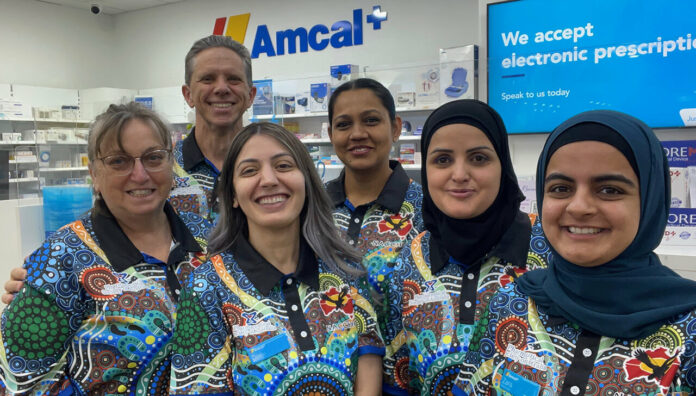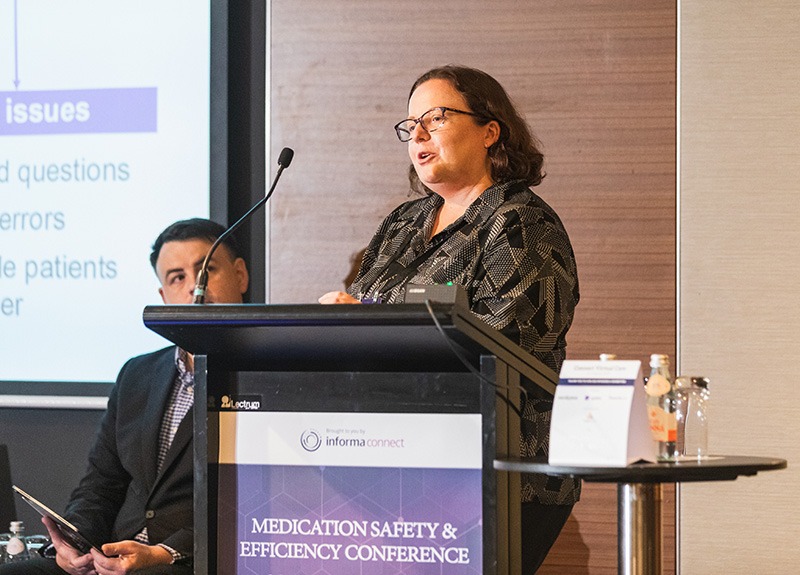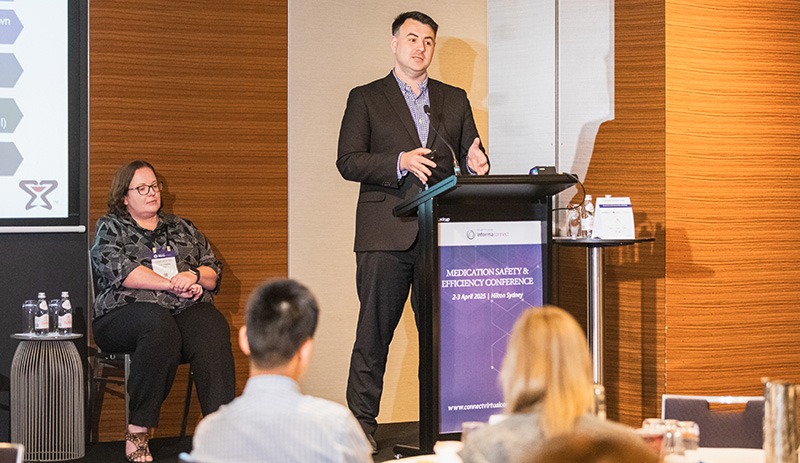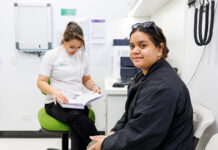
Far from being a sign of disrespect, displaying Aboriginal and Torres Strait Islander symbols is a sign of allyship.
A sizable proportion of the clientele at Emerton Amcal Pharmacy in Western Sydney are Aboriginal and Torres Strait Islander peoples, with First Nations clients making up around 15.3% of the patient base.
In the quest to provide culturally safe health care services, all pharmacists at Emerton, owned by Curtis Ruhnau MPS, Margaret Ruhnau MPS and Matthew Quick MPS, have completed PSA’s Deadly pharmacists foundation training course.
Yet, despite their training, the pharmacists at Emerton (and sometimes, the proprietors) felt reluctant to wear First Nations designs, shirts, or pins for fear of appearing tokenistic.
Ahead of National Close the Gap Day (21 March 2024), an Early Career Pharmacist explains how she overcame these feelings of imposter syndrome through a mix of client reception and acquiring cultural knowledge to work towards improving health outcomes for Aboriginal and Torres Strait Islander peoples.
Turning points
Before completing the Deadly pharmacists training course, Zara Gul MPS was just trying to fulfil her role as a health professional when providing services to Aboriginal and Torres Strait Islander clients.
‘I was aiming to treat everyone the same, adapting my approach based on health literacy,’ she said.
Post-training, she has a much broader understanding of how Aboriginal and Torres Strait Islander clients view health, the importance of a good yarn, and how to tailor information accordingly.
But it took some time to arrive at this point, and feel comfortable rocking the deadly pharmacists shirt.
‘I finished the course earlier on, so it was just me wearing it at first, along with Curtis, Margaret and Matthew,’ said Ms Gul. ‘I would have my cardigan over the top just in case I offended someone or overstepped any cultural boundaries.’
It was the positive feedback from Aboriginal and Torres Strait Islander clients, coupled with some gentle leadership encouragement, that helped Ms Gul and her colleagues feel comfortable wearing First Nation designs.
The starting point was when a young Aboriginal client complimented Margaret on her shirt, and she pointed out that Zara was wearing one too.
‘Margaret said, “she’s also done her training”, and the client gave me two big thumbs up,’ she said.
‘We’ve since had a lot of positive feedback from clients. Everyone [says], “We like your shirt. Where did you get your shirt from? Can we get a shirt?”’
This has fueled a rapport with clients, with Ms Gul noticing people from the Aboriginal Torres Strait Islander backgrounds feel comfortable speaking more openly with her about their health.
‘We try not to stay behind the counter so we can chat face-to-face with clients,’ she said.
‘We also let clients know we’ve earned this shirt, and that we had to do a course that helped to improve our knowledge for providing healthcare to First Nations people.’
Collaborative healthcare
A key takeout for Ms Gul from undergoing the Deadly Pharmacists training was the understanding that First Nations clients take a community approach to healthcare.
‘It’s not just individual patients, they work with other members in the community and receive a lot of help from their family,’ she said. ‘It’s about understanding that we need to take an integrated approach to healthcare, including with doctors and medical centres that clients frequent to ensure timely access to medicines.’
The team also strives to facilitate access to funded services.
‘For example, with conditions such as sleep apnea, we can work with the Integrated Team Care Program to help Aboriginal and Torres Strait Islander clients obtain funding for their devices,’ said Ms Gul.
Working closely with Aboriginal health and support workers, particularly when organising dose administration aids (DAA), is also an important component of providing community-based care.
‘We liaise with them, make sure clients’ scripts are organised, and that medications are ready for pickup when they come in, so there are no gaps in care.’
Through relationship building, health outcomes for one Aboriginal and Torres Strait Islander client with significant mental health issues drastically improved.
‘Some of her medications are quite regulated, so by communicating well with her as well as her doctor, we’re getting the scripts for the regulated medicines prepared in a timely manner,’ she said.
When the client comes to pick up her medication every week, her DAA is complete, removing any additional stressors.
‘Her mental health is no longer deteriorating because she’s more adherent to her medication, and she’s coming in to pick up her DAA on the right days as well,’ said Ms Gul.
Programs such as the Deadly Pharmacists foundation training course are not only for those interested in working in Aboriginal Community-Controlled Health Services, but for any pharmacist who wants to improve service delivery.
‘Now that we’ve received such positive feedback, it has built my confidence – both in terms of wearing the shirt and providing information to First Nations clients about their healthcare,’ she said.
The pharmacy’s floor staff have also undergone cultural competency training, earning the right to wear their own shirts with Aboriginal and Torres strait Islander designs.
‘That way, on Mondays and Fridays, we all wear the shirts. So we stand united as a team,’ added Ms Gul.
Get involved
Any pharmacist can undertake PSA’s Deadly pharmacists foundation training course as part of their continuing professional development to improve cultural awareness and safety while earning up to 14 Group 2 CPD credits.
Pharmacists who have completed the course still have the opportunity to purchase a Deadly Pharmacist polo shirt or scarf through reaching out to projects@psa.org.au.
For pharmacists who identify as Aboriginal and Torres Strait Islander individuals, Expressions of Interest (EOI) for the annual PSA Faye McMillan Conference Grant to attend PSA24, sponsored by Care Pharmaceuticals and Hydralyte, opens this Thursday (21 March).
The EOI is open until 16 May, with the successful applicant announced on 27 May.



 Jess Hadley, community pharmacist and Professional Officer at PDL[/caption]
Jess Hadley, community pharmacist and Professional Officer at PDL[/caption]
 Peter Guthrey, Senior Pharmacist – Strategic Policy at PSA[/caption]
Peter Guthrey, Senior Pharmacist – Strategic Policy at PSA[/caption]


 Professor Margie Danchin[/caption]
Professor Margie Danchin[/caption]

 Dr Peter Tenni[/caption]
Dr Peter Tenni[/caption]
 How should we deprescribe gabapentinoids, according to the Maudsley Deprescribing Guidelines[/caption]
How should we deprescribe gabapentinoids, according to the Maudsley Deprescribing Guidelines[/caption]





